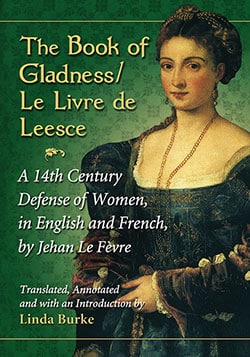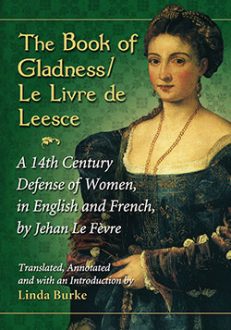Subtotal: $17.99
The Book of Gladness / Le Livre de Leesce
A 14th Century Defense of Women, in English and French, by Jehan Le Fèvre
$39.95
In stock
About the Book
The Book of Gladness (ca. 1380) contains one of the most powerful, original, and influential pro-feminine voices of the late Middle Ages. In a spirited riposte to the misogynist tradition, Le Fèvre (with the help of Gladness, his lady-persona) boldly reinterprets the Bible while questioning ancient authorities in the light of “true” experience, especially his own.
Despite its foundational importance, this work has never been translated into English. The present prose translation is lively and accessible, yet thoroughly grounded in scholarship. An Introduction explains the textual challenges hindering the full recognition of this classic up to now and elucidates its contribution to the medieval debate on the nature and status of women and marriage. Also included is the first-ever English translation and discussion of a newly discovered scribal interpolation on Christine de Pizan in a manuscript of Jehan Le Fèvre’s Lamentations. The bibliography provides the first complete list of manuscripts containing the French Lamentations and Le Livre de Leesce.
About the Author(s)
Bibliographic Details
Jehan Le Fèvre
Format: softcover (7 x 10)
Pages: 168
Bibliographic Info: appendices, notes, bibliography, index
Copyright Date: 2013
pISBN: 978-0-7864-7427-1
eISBN: 978-1-4766-1249-2
Imprint: McFarland
Table of Contents
Table of Contents
Acknowledgments ix
Abbreviations xi
Introduction 1
A Note on the French Text and Translation 33
Le Livre de Leesce (French text) 35
The Book of Gladness 74
Appendix: A Unique Interpolation on Christine de Pizan in a Manuscript of Jehan Le Fèvre’s Lamentations and Livre de Leesce 133
Annotated Bibliography 139
Index of People, Places and Writings 151
Book Reviews & Awards
Translation of the Month—Feminae: Medieval Women and Gender Index
“It is always a matter for rejoicing when a hitherto-untranslated medieval work becomes available in an affordable English translation…. The translation is readable and lively…. There is a great deal to praise in this project overall, beyond the accuracy and energy of the translation. Burke’s bibliography, for example is much more informative than most bibliographies are these days…. a laudable contribution to Medieval Studies”—The Medieval Review; “Burke has provided in her scholarly annotations that accompany her translation a host of useful information…largely accurate and readable…the merit of Burke’s book is that it introduces a key medieval French text to a wider public, and the helpful notes enable it to be read by nonspecialists in a convenient format”—Symposium; “a useful, and accessible, addition to our growing library of discourse for and against women at the end of the Middle Ages”—Medium Aevum; “a very solid and highly useful edition and translation”—Mediaevistik; “Thanks to her new edition and translation, this work promises to finally receive the attention it deserves…extraordinary. Her translation is masterful, and the critical notes are abundant. A superb piece of scholarship that offers great insight on the perception of women in the Middle Ages. As such, it could easily become the central piece of undergraduate and graduate classes on medieval gender, but also could be used as a good piece of insight on gender in the Middle Ages…. Its intellect, critical apparatus and splendid translation make it a (major piece of) work that should be read by all interested in such subjects”—Charles-Louis Morand-Metivier, University of Vermont, Medieval Feminist Forum; “translator Burke works carefully to maintain what must have been the tone of the fourteenth-century original…well-translated”—Reference & Research Book News; “Accompanied by a thorough, insightful Introduction, Linda Burke’s accomplished translation of Jehan Le Fèvre’s Livre de Leesce rescues from inappropriate neglect this late medieval serio-comic “defense of women” that influenced Chaucer and Christine de Pisan.”—Robert W. Hanning, Columbia University; “Linda Burke’s translation emphasizes euphony, while taking into account the peculiarities of Le Fèvre’s Middle French. She elucidates the sometimes unusual turns of phrase with a rendering that is modern, natural, and highly readable.”—Tina-Marie Ranalli, Worcester Polytechnic Institute; “Linda Burke’s richly annotated new translation of Jehan Le Fèvre’s Livre de Leesce/The Book of Gladness compounds the remarkable: elegance, accuracy, erudition, together with a text restored to deserved centrality in the medieval canon. Medievalists everywhere owe her a great debt.”—R.F. Yeager, University of West Florida.

 A Worldbuilder’s Guide to Magic
A Worldbuilder’s Guide to Magic 






